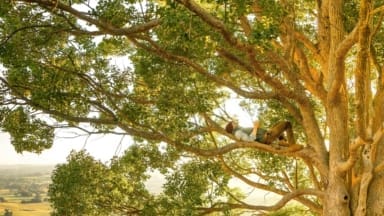
Climate change is causing more extreme weather conditions, with heatwaves claiming thousands of lives each year. Trees can help reduce temperatures on the ground by up to 12°C. Doubling urban tree cover from 15% to 30% could lower average city temperatures by 0.4°C, and in some areas by as much as 5.9°C, potentially saving thousands of lives.
In the poll of 255 doctors from practices across the country, 70% say they should be able to prescribe time out in nature to ensure the health of future generations. 77% of the GPs believe that more trees could help reduce the financial burden on the NHS, and 94% are calling for more trees around urban schools to combat lung diseases like asthma. Previous research has found significantly lower asthma rates among children aged four to five in areas with more street trees.
Almost half of doctors (45%) have seen a rise in patients reporting climate anxiety in the past 12 months, with the survey results clearly showing that against the backdrop of a changing climate, improving the environment must be integral to safeguarding people’s future health.
Dr Darren Moorcroft, chief executive of the Woodland Trust, said: “This powerful research, from trusted medical professionals, shows the need to prioritise the environment to reduce the burden on the NHS and save lives. Policymakers must take heed of these results. A startling 96% of GPs – who are on the front line of healthcare in this country – want environmental issues moved up the political agenda. They recognise the potentially life-giving benefits of a cleaner, greener world, ever more important due to the greater effects of climate change – and want their patients to be able to access those benefits more easily.”
Dr David Wrigley, deputy chair of BMA’s GP Committee England, said: “Our health and the environment are entwined in almost every way, and the potential benefits of more green spaces from both a mental and physical wellbeing perspective are yet to be realised. It’s important that we ensure more people have equal access to these spaces and that we do everything we can to protect the future of our planet and its people. Reducing the carbon footprint of practices will not only help to do our bit to mitigate climate change, but it can potentially improve patient health, support our communities and reduce the financial burden placed on the NHS, which will have long term benefits for generations to come.”
Trish Goodwin, Link Worker for Bolton GP Federation said: “This poll clearly shows how GPs value the important role of nature and the environment in helping to reduce the pressure on their services and the NHS in general. With the changing climate we believe it should be a priority. From our perspective, people that attend green projects, such as walking in rural locations, report an improvement in physical health symptoms and state that there is a significant improvement in their mental wellbeing. It is critical that patients living in urban and high pollution areas have access to woodland and green spaces to improve both their physical and mental health.”
Dr Moorcroft added: “We know it’s going to take more than trees to solve the climate crisis, but we won’t have a world worth living in without billions more of them. We have made it our mission here in the UK to plant 50 million more trees by 2030. Woods and trees make us healthy and happy. They lock up carbon, fight the effects of climate change, improve our health and wellbeing and reduce pollution and flooding; protecting nature, people and our planet. This is why we are asking for people to support our climate campaign to plant more trees.”
In partnership with American Forests, the Woodland Trust developed the Tree Equity Map which shows that in areas of lower tree cover there are less positive health outcomes – allowing for a more targeted approach to tree planting in areas most in need. With a general election looming, the Woodland Trust is calling on political parties and people to make increasing native tree cover a long-term target.

